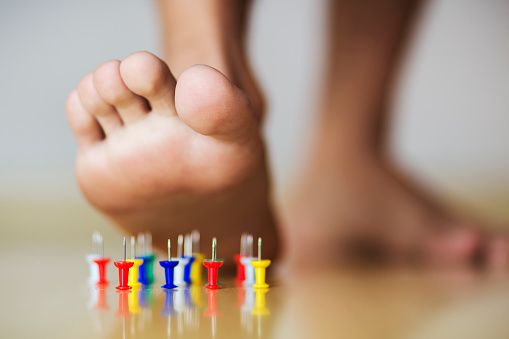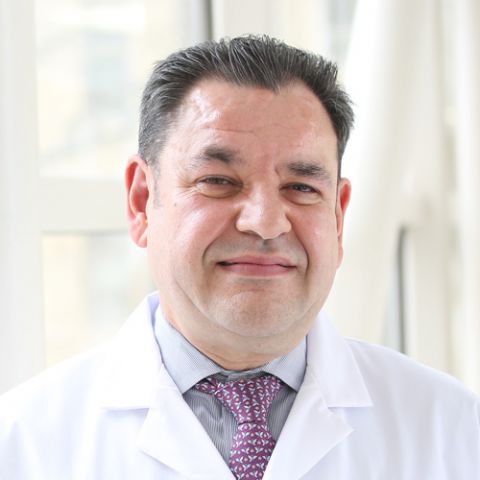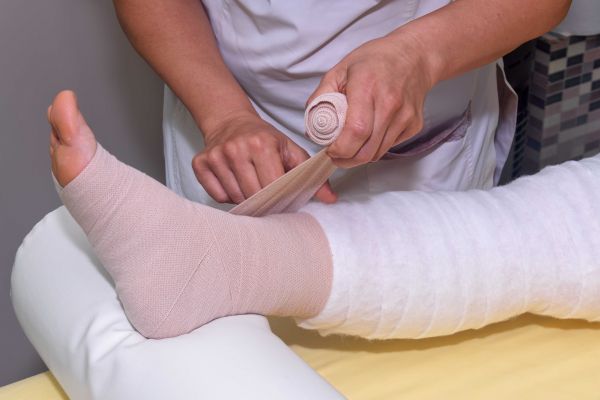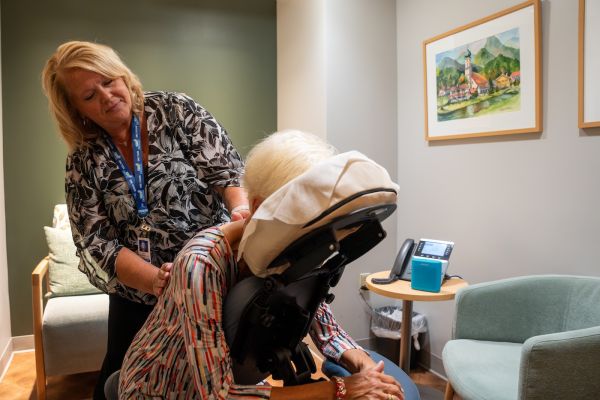When Sue Began Treatment at Roswell Park, She Finally Found Relief for a Painful Neuropathy that She Dealt with for a Decade
Cancer treatment can vary widely, depending on the type, location, stage and many other factors. A side effect of some treatments is pain and discomfort for the patient. The National Cancer Institute estimates that pain occurs in 20 percent to 50 percent of patients with cancer, and roughly 80 percent of patients with advanced-stage cancer have moderate to severe pain.
In 2004, Sue was diagnosed with stage III breast cancer. The cancer had spread to her lymph nodes, so she received an intense chemotherapy treatment, which caused damage to her peripheral nervous system. As a result, Sue developed peripheral neuropathy, a condition that caused pain in her feet and lower legs, making it difficult for her to walk and stand for extended periods of time.
“I would have to go shopping at 5:30 a.m. so I could avoid having to stand in lines,” says Sue. “My doctors kept telling me that the pain would go away in a few weeks, then a few months, then a year, but no one would treat it.”
While Sue’s breast cancer went into remission, the pain lingered.
A decade later, Sue’s breast cancer had come back. Now living in Buffalo, she was able to receive treatment for her cancer at Roswell Park Comprehensive Cancer Center. “While I was receiving treatment at Roswell Park, I was put in touch with Dr. de Leon-Casasola to assist me with my pain, and I finally got help,” says Sue.
Never miss another Cancer Talk blog!
Sign up to receive our monthly Cancer Talk e-newsletter.
Sign up!Oscar de Leon-Casasola, MD, Chief of Pain Medicine at Roswell Park, worked with Sue and recommended an intrathecal pump system to help manage Sue’s pain after several oral modalities had failed. The intrathecal pump system is implanted between the muscle and skin of the abdomen, and a catheter releases pain medication slowly to the spinal cord and nerves.
“The practice of pain management in the cancer patient is very rewarding in itself. However, when one sees the results achieved by patients like Sue in her pain control and the improvement in her quality of life, the incentive to continue working for the benefit of these patients is even greater,” says Dr. de Leon-Casasola. “Translation of basic science research into patient care has, in our experience, benefited individuals that are in dire need of alternatives to control their pain. I am blissful on a daily basis to see that we have been able to help patients who are in severe pain with the implementation of multimodal pharmacologic-based protocols and the use of interventional techniques such as intrathecal therapy with a combination of medications.”
After two years of treatment for her second battle with breast cancer and enduring the pain in her lower legs and feet, Sue had a revelation. “I went for a long shopping trip to two big box stores and a grocery store. It wasn’t until later that I realized I wasn’t in screaming pain, and I’d done something I could never have done for about 10 years,” says Sue. “Before my treatment at Roswell Park I tried to remain active, but I was at a point where I was contemplating getting a mobility scooter. I was not happy thinking about life with a scooter, but Dr. de Leon-Casasola and the pain management team helped me, and I am so thankful. I had to slow down for a while, but now I can speed back up again.”
If you're dealing with pain as a result of your cancer treatment, find out if Roswell Park can help you. Individuals with cancer pain can be referred to the Cancer Pain Management Service by their personal physician or their primary physician at Roswell Park Comprehensive Cancer Center. If you would like a referral to a physician at Roswell Park Comprehensive Cancer Center, please call 1-800-ROSWELL or the Pain Clinic at 716-845-4595.
Editor’s Note: Cancer patient outcomes and experiences may vary, even for those with the same type of cancer. An individual patient’s story should not be used as a prediction of how another patient will respond to treatment. Roswell Park is transparent about the survival rates of our patients as compared to national standards, and provides this information, when available, within the cancer type sections of this website.



